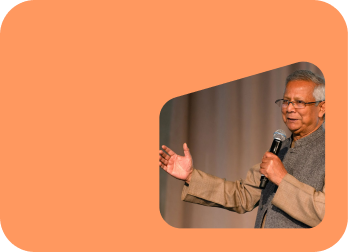It's Time to Put Affordable Health Care for the Poor Within Reach
Author- Professor Muhammad Yunus
Published on- The World Post
Date- May 23, 2009
During these times when many of the poor are struggling for a livelihood, health care seems less affordable than ever to so many of the impoverished. A family illness already is the primary force shoving people back into poverty. It’s time for us to offer them the tools to push back.
A major part of the problem is that medical progress today typically arrives in partnership with high cost. As a result, poor people all over the world are left in desperate need of less expensive, but high-quality health care options.
Until recently, this dilemma seemed unsolvable. But new circumstances offer great hope to my own country, Bangladesh, and the poor around the globe, including the United States. Already in the United States, people are taking advantage of much more affordable health care delivery models such as retail health clinics and direct contracts for conveying health services between small businesses and hospitals. Many of the tools and services we are delivering in Bangladesh will inspire new, more affordable models for this cost-conscious environment.
Bangladesh has shown it is possible to make remarkable progress in health status no matter how poor and crowded a country is to start. In the last 40 years, the child mortality rate in Bangladesh dropped from about 24 percent to below 7 percent. During the same period, the birth rate dropped from more than seven children per woman on average to just under three children per woman. Health experts have described this phenomenon as “The Bangladeshi Miracle,” and it has made a better life possible for many citizens of my country.
We are still at a serious disadvantage, however. Many basic health care services remain out of reach for most Bangladeshis because the average per capita annual income is about $600. We plan to address this problem by developing a health care system that will be high-quality, affordable, and self-sustaining. We expect this system to serve all of the people of Bangladesh, no matter what their income level is, and that most parts of it will be transferable to other countries.
This is not as farfetched as it sounds, and it doesn’t have to cost billions of dollars. There are three models for such a system, each requiring new thinking about how to deliver care the most efficient way. In the first model, primary care is delivered to all of the poor, and they all pay just enough to keep the business sustainable. In the second model, the business offers a service for which the rich also are willing to pay, thereby underwriting treatment of the poor. In the last model, already profitable businesses can set up and operate joint-ventures that are sustainable as “social businesses” that seek to maximize the benefits for the poor. Investors can recoup their investments, but the profits are reinvested.
We already have established that the poor can and will pay for their own care, if it is reasonably priced. Nothing is more valuable to people than health care, and by paying, they feel less like beggars and more like “customers” who can and should demand quality care.
For example, Grameen Bank has built 51 clinics that recover 93 percent of their costs by selling very inexpensive insurance policies, asking patients to pay a very small fee at the point of service, and selling pharmaceuticals and diagnostic services. Even the poorest patients who use these clinics pay something or promise some payment at a future date. No one is turned away. The Grameen clinics prove that a medical system “for the poor” can be almost entirely self-supporting, and we hope we can make it fully self sufficient so we can expand it across Bangladesh.
We also can better serve the poor by finding new models of care delivery. Grameen GC Eye Care Hospital in Bangladesh is based upon the remarkable Aravind hospital in India. Both centers can do cataract surgery for $25. Aravind’s founder was inspired by McDonald’s and Pizza Hut to find a way to mass market cataract surgery. He developed a system where the hospital manufactures its own materials (which it also sells to others), where instruments are used around the clock to pay their upkeep, and where doctors focus only on performing surgery while nurses and technicians handle pre-op and post-op care.
Such examples are becoming increasingly numerous. Leading Indian hospitals, which have U.S.-trained doctors, now can perform open heart surgery for just $6,000. Dr. Devi Shetty of the Narayana Hrudayalaya Hospital in Bangalore, India, offers high-quality by-pass surgery for $2,000. His goal has been to hold down prices enough that even low-income people can afford to pay through a combination of low-cost health insurance premiums and bank loans.
Some of these endeavors operate with profits. Others, which I call social businesses, put back any profits they make towards helping the community by improving and expanding services.
In Bangladesh, Grameen Danone yogurt has built a very efficient plant for fortified yogurt that can help to meet the nutritional needs of children in a sustainable way. Grameen Veolia Water has constructed a sustainable water plant that can serve a population of 50,000. Many other companies are joining us to create similar social businesses.
Health care can be made more affordable for the poor without requiring major new scientific developments, just the smart application of current technologies. We have seen a $25 incubator and diagnostic instruments that are built tough, cheap, and reusable for the developing world. We need more such products, and we must improve health promotion, disease prevention, early detection, and compliance cost-effectively.
We are determined to build a health care system in Bangladesh that truly serves the poor. Surely many parts of this model can be replicated around the world and adapted to other regions. We are scouring the world for ideas for new tools, equipment, and service models to serve the poor. Truly affordable but high-quality health care tools and services are the only means by which quality health care can be provided to all.
Source - http://www.huffingtonpost.com/muhammad-yunus/its-time-to-put-affordabl_b_189972.html?;


 SOCIAL BUSINESS
SOCIAL BUSINESS 

 Events
Events News
News



